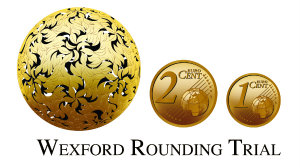Wexford Rounding Trial reveals strong support for rounding

National Payments Plan (NPP) recommends rounding is rolled out nationally on voluntary basis, whereby 1c and 2c coins would remain legal tender
14 March 2014
The Wexford Rounding Trial has revealed strong support for rounding from both consumers and retailers. The trial was conducted by the Central Bank’s National Payments Plan from 16 September to 17 November 2013 with the aim of reducing the need for 1c and 2c coins,
The experiment was conducted following market research that showed consumers and retailers do not like these small denomination coins. According to NPP programme manager, Ronnie O’Toole: "The results of the trial were clear. The answer from Wexford was a resounding ‘yes’. When ‘don’t knows’ are excluded, 85% of consumers and 100% of retailers surveyed believe rounding should be applied nationally."
During the trial retailers rounded cash transactions to the nearest five cents at the cash register, removing the need for 1c and 2c coins in change. Five EU member states have already adopted a symmetrical rounding policy; The Netherlands, Sweden, Finland, Denmark and Hungary, while Belgium is currently in the process of adopting it.
One of the concerns consumers had before the trial was that retailers would round up the price of goods; however, a mystery shopping exercise showed that rounding had no inflationary effect. O’Toole added: ‘We expected that the trial wouldn’t result in price rises. Rounding only applies to total bills, not to the prices of individual goods. Quite simply, the price of almost all goods tracked over the nine weeks of the trial remained unchanged."
The Central Bank mints many more of these small denomination coins than other coins, but they go out of circulation quickly because of stockpiling and shops constantly need fresh supplies for change. While the direct average cost of producing these coins exceeds their face value, with a 1c coin costing approximately 1.3c to mint, there are significant other economic costs associated with the transport and storage of these coins in the economy.
Chairman of the NPP, Tony Grimes, said: "On the basis of the successful trial, the NPP Steering Committee has now recommended to the Minister of Finance that symmetrical rounding is rolled out nationally, and that it is run on a voluntary basis for both consumers and retailers. This report can help inform the Minister’s decision on a national rollout."
The NPP added a national rollout would require a widespread communications and education plan aimed at both consumers and retailers, and a sufficient lead-in time to make sure that retailers have an adequate time to prepare. In the event of a national rollout the 1c and 2c coins would retain their status as legal tender.



 Print
Print






Fans 0
Followers